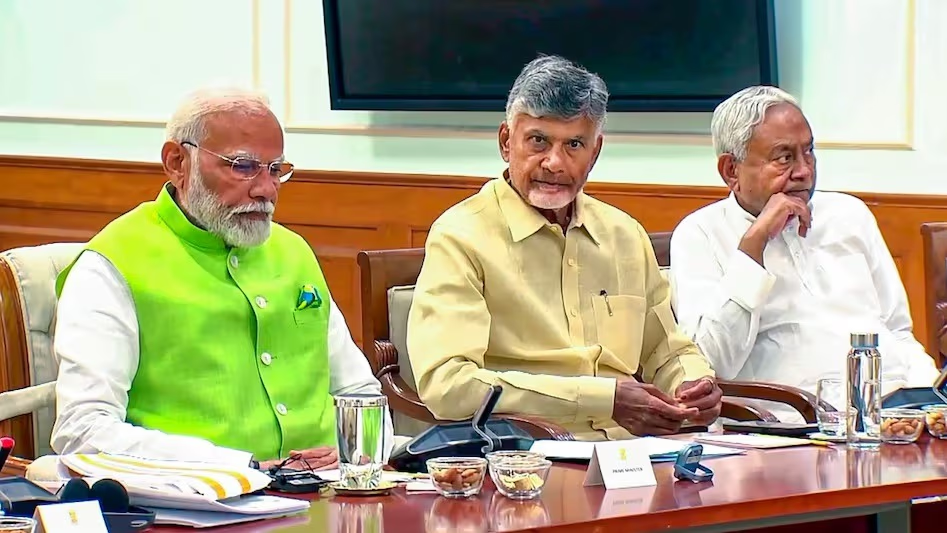Even though the NDA has secured a clear majority in the Lok Sabha election results, the BJP is still short of the magical number of 272 on its own. In the third term of the NDA government and Narendra Modi's prime ministerial hat-trick, Bihar and Andhra Pradesh's regional parties have emerged as kingmakers. The future of the new government hinges on the Telugu Desam Party (TDP) led by N. Chandrababu Naidu in Andhra Pradesh and Nitish Kumar's Janata Dal United (JDU) in Bihar. Both parties are acutely aware of this fact. As a result, demands that had until now remained merely electoral issues are beginning to be voiced within the government.
Bihar and Andhra Pradesh have both been demanding special state status for a long time. Now that these parties have a chance to play a significant role in the central government, their leaders have reignited their demands.
Nitish Kumar and his confidants also raise the demand
Chief Minister Nitish Kumar has been advocating for special state status and a special package for Bihar since he first took the oath as Chief Minister in 2005. He reiterated this demand last November when he released caste census data.
JDU General Secretary KC Tyagi has also stated the need to include Bihar as a special state. Tyagi said that they aspire for Bihar to gain the special state status and will strive to achieve it.
Nitish's associate and State Minister Vijay Choudhary has also demanded special status for Bihar. Choudhary stated that they have long argued that Bihar deserves special status, special assistance, and a special package due to limited resources. The state should receive special help, he added.
Read More: What is the special state status and category... With the formation of the new government, why are both terms in discussion
Andhra Pradesh is also demanding special state status
Similarly, TDP chief N. Chandrababu Naidu has been campaigning for a long time for the special status of Andhra Pradesh. Naidu first made the demand for special status in 2017.
So far, 11 states have been granted special state status
Northeastern states like Assam and Nagaland were the first to receive special status in 1969. Later, Himachal Pradesh, Manipur, Meghalaya, Sikkim, Tripura, Arunachal Pradesh, Mizoram, Uttarakhand, and Telangana, totaling 11 states, were granted special category state status. The latest state to gain this status is Telangana, which was created from the division of Andhra Pradesh, impacting its financial systems significantly.
Jammu and Kashmir was first granted a unique status, which has now been changed to a Union Territory following the revocation of Article 370.
What is the special category status? What is its historical context? Who bestows this status on the states? What are the benefits? What criteria are used to assign special category status to states?
Find out...
Also Read: 'Central government should grant special state status to Bihar,' says CM Nitish Kumar, reiterating an old demand
How is special category status granted?
The central government awards special category status to socio-economically and geographically backward states to support their development. This classification was advised by the fifth Finance Commission in 1969. As India is a union of states, currently there are 29 states and 7 union territories. According to the recommendations of the Finance Commission, all these states and union territories receive a portion of the central government's revenue every five years.
According to Article 275 of the Indian Constitution, the central government can provide additional financial assistance to any state aside from the recommendations of the Finance Commission. Out of the 29 Indian states, 11 already have special category status, and 5 more are requesting it.
Which states were first awarded special state status?
Three states, Jammu and Kashmir (now a union territory), Assam, and Nagaland, were given special category status in 1969, based on the recommendations of the fifth Finance Commission headed by Mahavir Tyagi. When the Gadgil Formula was accepted in 1969, the idea of special category status was introduced for the first time.
These three states qualified for special status due to their social, economic, and geographical backwardness. Challenging hilly terrains, strategic border locations, low per capita income, low population density, a significant tribal population, backwardness in economics and infrastructure, as well as the non-viability of state finances, and other needs are reasons for granting special category status. The National Development Council has accorded special category status to states with these attributes for planning assistance. Today, the central government manages this process.
Also Read: 'If Bihar is not granted special state status, we will agitate,' states CM Nitish Kumar
No constitutional provision
Special category status (SCS) is awarded based on the developmental pace of a backward state. If a state is geographically, socially, and economically backward, it receives special exemptions from taxes and duties. However, the constitution does not have a provision for granting special status for overall development of a state.
Special category status is different from special category state
Under the then Congress-led UPA government, on 18th February 2014, the parliament passed a bill granting special status to Telangana and separating it from Andhra Pradesh. Subsequently, the 14th Finance Commission ceased 'special category status' for all states except the northeastern and three hill states. It recommended adjusting resource gaps through tax transfers, suggesting an increase from 32% to 42%.
Special category state is different from special status, as the former enhances legislative and political rights while the latter is concerned solely with economic and financial aspects.
Qualifying conditions for granting a state special status
A state stru...




